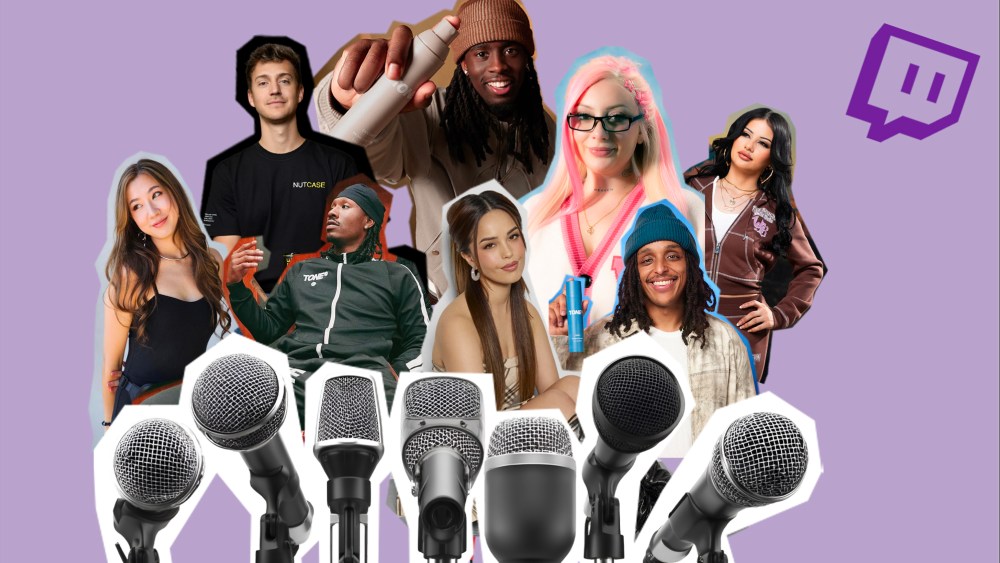It’s time for the streamers.
If the 2010s marked the onset of the influencer era, the 2020s are poised to become similarly synonymous with the rise of streamers, who are beginning to make their mark on fashion, beauty and business.
In fact, some of the most influential online personalities of recent years — Kai Cenat, Hasan Piker, Tyler Blevins, Valkyrae and more — are not primarily of Instagram, TikTok nor YouTube fame like influencers past; they’re native to Twitch.
Launched in 2007 as Justin.tv, Twitch is a streaming platform which became best known in the 2010s as a place for gaming and esports fans to watch streamers play their favorite games — from Halo to Fortnite to World of Warcraft and beyond.
You May Also Like
Though Twitch, which was acquired by Amazon in 2014, isn’t the only platform known for this kind of live content, it is one of the most dominant, tracking ahead of YouTube Gaming, Steam and Kick in 2024 by both hours watched and unique channels, according to a joint report by Streamlabs and Stream Hatchet.
The platform nets more than 105 million monthly active users, and while games like League of Legends and Grand Theft Auto V remain among the top-viewed categories on Twitch today, broader-appeal categories — “Just Chatting” and “IRL” (an acronym for “in real life”) among them — have also soared to prominence post-pandemic, casting a wider audience net.
“The Twitch landscape has evolved immensely over the last 10 years,” said Mike Lee, who heads up United Talent Agency’s gaming and esports talent division. “Live content — mainly, live sports — has always driven culture, and Twitch did a great job during COVID-19, when everyone was sheltered at home, of giving people a peek into other people’s lives. That accelerated this trend that was always going to happen, of more and more people discovering livestreaming and live content.”
Even though TikTok was popularizing a rather opposite mode of content — shortform video — at the same time, Twitch saw a boom during pandemic lockdowns. Not only did this period mark an increase in non-gaming content on the platform, it also brought more female users, as well as Gen Alpha and Gen Z users, into the fold.
As a result, the platform’s heaviest hitters have been quietly building sky-high levels of influence among these audiences, and are now setting their sights on forging new frontiers of entertainment and consumer products in ways that are poised to impact culture — including fashion, beauty and business — in a big way.
“In terms of what kids are paying attention to and what drives culture, Twitch and livestream are at the center right now,” said Reed Duchscher, founder and chief executive officer of talent management company Night.
The way seasoned beauty executive Nathaniel Weiss sees it, “streamers, especially IRL streamers, are kind of like a modern version of late-night television. They’ll be on for a couple of hours; there’s sometimes a comedy piece, a music piece, and then there’s almost this miniature media cycle that happens between Twitch, TikTok and X, where things that happen on Twitch get clipped and become news on other social media platforms.”
Weiss would know: last year, he left his post as president of clean body care brand Nécessaire to serve as chief executive officer of Tone, a fragrance-led personal care brand founded by none other than Cenat and his crew of fellow Atlanta-based streamers including Duke Dennis, Fanum, ChrisNxtDoor, ImDavisss and Agent 00, who collectively comprise a content group called AMP (“Any Means Possible”).

With 18.6 million followers, Cenat is the third most-followed Twitch streamer, behind gaming-focused Blevins, who goes by “Ninja,” and Ibai, a Barcelona-based esports commentator. He and AMP are best known for their vlog-style broadcasts, with Cenat also drawing A-list guests ranging from Kevin Hart to Nicki Minaj to his streams.
In February, Tone debuted direct-to-consumer with a range of body lotions, deodorants and lip balms coming in four unisex scent families, each priced under $15. In less than a week, the brand crossed the seven-figure sales threshold and by July, the brand launched nationwide at Target, where it is now “one of the top-performing deodorant and fragrance brands since launch,” said Weiss. Data from CreatorIQ shows the brand surged to 6.6 million (non-Twitch) impressions in July following the launch, up from around 309,000 in June.
Tone, which is incubated by Night, was unveiled via a streaming broadcast, and its founders have continued to market the brand primarily through the medium since.

“These new streamers — they have a playbook. They know what it takes to get popular, they know what it takes to be a good brand ambassador — the opportunity to make streaming a career is better now than it has been,” said Lee.
Indeed, Blevins, who took to the platform in 2011 and soon became its biggest Halo streamer (which, he clarified, at that time meant getting around 500 viewers per stream — a far cry from his now-typical 100,000 to 500,000-viewer range), has similarly leveraged his following into entrepreneurial savvy.
In 2023, the gamer cofounded flavored cashew milk brand, NutCase, with Joelle Weinand, aiming to capture momentum for milk alternatives as well as the internet’s mounting affinity for “lil sweet treats,” as Blevins put it. (See: Dubai chocolate, strawberry matchas, Swedish candy store BonBon, among such viral fixations).
“NutCase is for anyone who has a sweet tooth and wants a sweet treat but doesn’t want to eat, for example, a whole pint of ice cream,” said Blevins.
The brand recently underwent a reformulation, and on Oct. 1 will unveil new vanilla- and chocolate-flavored milks featuring a decreased calorie count (going from 180 to 120 per can) and a repositioning as “hydration milks,” said Weinand. The milks retail for $36 for a pack of 12, and later this year will enter 12 Whole Foods doors in California, Nevada and Arizona, marking a first brick-and-mortar foray for the brand.

As for Blevins’ approach to streaming, he typically cross-streams on Twitch and YouTube each Tuesday through Friday from around 8 a.m. to 2 p.m., with his primary game now being Fortnite.
As far as what he typically talks about during these broadcasts, “I’m usually at the mercy of my chat,” said Blevins, adding that Twitch’s chat function, which allows streamers and their viewers to mutually react and engage live with each other, “is something streamers should always lean into — even if you just have one person talking to you, you can shoot the sh–t for quite some time.”
This level of interactivity between streamers and their audiences is one thing that sets Twitch, and livestreaming more broadly, apart in the social media ecosystem.
“What younger audiences are looking for in online spaces has changed in a way that is very advantageous for Twitch,” said Rachel Delphin, chief marketing officer of the streaming platform. “Today, content is very much about live, unfiltered, no edits — and because streaming is long-format, you tend to get a real sense of a person and their personality in a way that you can’t necessarily get through different mediums.”
While TikTok is similarly driven by this kind of less-polished content, Twitch is creator-driven to the point where few brands operate, or know how to operate, a stand-alone presence on the platform.
More often, brands tap into Twitch by sponsoring broadcasts by popular streamers, but even then, those are mainly gaming, esports or streamer equipment brands.
“The brands that understand Twitch the most are the platform-endemic brands of the last 10 years, but we’re seeing a lot more savvy brands also come into the space,” said Lee.
Among those are E.l.f. Beauty and Red Bull, which have steadily invested in the world of streaming in recent years. Most recently, Red Bull sponsored Ludwig Ahgren’s two-day Streamer Games earlier this month, which generated more than 32 million views across broadcasts by more than 62 participating streamers, per CreatorIQ.
Red Bull also counts multiple streamers among its roster of Red Bull Athletes, and at the Games announced the addition of Emily “Emiru” Schunk, a streamer with 1.8 million Twitch followers.
E.l.f., meanwhile, is one of a few brands that operate a stand-alone Twitch channel. Its secret sauce? Platforming established individuals in the space to stream and game via the E.l.f. channel alongside the brand’s associate director of gaming and artistry, Anna Bynum.
“We’re proud to work with an incredible group of female creators on Twitch — we call them our ‘Gamer Squad,’” said Patrick O’Keefe, chief integrated marketing officer at E.l.f., adding that the squad includes popular gamers like Loserfruit, Mish, Stefsanjati and Jayden.
The brand’s Elfyou channel counts just over 26,000 followers, and its most-streamed broadcast, which ran parallel to the Super Bowl in February, was called The E.l.f. Time Show!, garnering 1.1 million live views and 2.4 million total minutes watched.
Further interest in beauty on Twitch is brewing, too.
Data shows that the GRWM (“Get Ready With Me”) tag has 888,000 hours watched so far in 2025 on Twitch, a 101 percent year-over-year increase. Plus, women streamers like Wendy Ortiz and Vanilllamace, who previously built sizable followings on TikTok and Instagram, are now migrating to the platform — which is indicative of a larger trend happening among influencers.
“Five, six years ago, I think a large TikToker would have been like, ‘No — I’m happy with all the revenue I make on TikTok,’ where they love being able to make content, and then plan for a week, and then make different content — whereas with Twitch, you’re always making content on the fly,” said Lee, adding that UTA was drawn to Vanilllamace in part because her 500,000-strong Twitch audience is more than 80 percent female. “That’s so rare for us, and that’s rare on Twitch — especially for someone of her size. But with more influencers like her coming onto the platform, that’s going to draw more brands to the space.”
When Valkyrae (whose full name is Rachell Hofstetter) returned to Twitch in January after her five-year exclusive streaming contract with YouTube expired, she reclaimed the title as the platform’s most-watched female streamer in her first week back, receiving over 706,000 hours of watch time.
She, too, previously dabbled in beauty with a short-lived skin care line called Rflct, which was codeveloped by brand incubator Ideavation Labs. The line swiftly faced skepticism regarding its claims about blue light protection, which were foundational to its products, and within two weeks of debuting at Ulta in 2021, the brand shuttered.
The streamer has moved onto other endeavors, though, most recently announcing the launch of a media company called Hihi Studios last fall. “We’re going to be releasing animes, cartoons, shows — the possibilities are endless,” said Valkyrae.



